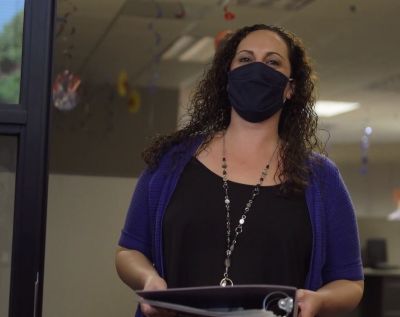Every day, nurses and other clinicians face on-the-job stressors most other professionals will never encounter: Infection exposure risks, life-altering decisions, noncompliant patients, complicated family dynamics, and death may all be routine parts of the job, especially in intensive and critical care settings.
While many clinicians grow used to these aspects of their work, they don’t necessarily become immune to the long-term impact. Studies suggest that the high demands on professional healthcare workers lead to burnout in 62% of nurses.
What is nurse burnout?
Burnout is a work-related syndrome marked by emotional exhaustion, a reduced sense of personal accomplishment, and elevated depersonalization—in other words, viewing patients as objects or obstacles rather than human beings.
Clinicians who are burned out experience a variety of symptoms and related negative effects at home and at work.
When burnout hinders job performance, patients may suffer, too.
Nurse burnout seems to be more prevalent than physician burnout, but it’s also considerably more visible to the public: Most patients will spend far more time with a nurse than a doctor, and US nurses outnumber US physicians by nearly 5 to 1. Even so, the symptoms and associated risks of nurse burnout apply to all patient-facing healthcare professionals.
As a people-focused company, VITAS supports the overall health and wellness of our employees—and that includes providing resources to help prevent and overcome nurse burnout. Team managers are present and involved, offering inspiration and support. Team members are always available to back each other up and provide each other with clinical advice, emotional support, and spiritual support.
What does nurse burnout feel like?
Burned-out nurses often find themselves dreading the start of each workday and feeling like their best efforts are never enough. They may downplay their own successes and bristle at any perceived slight or shortcoming from their coworkers.
Nurses coping with burnout may see their patients primarily as sources of frustration instead of individuals deserving compassion and grace.
Other symptoms of nurse burnout include:
- Physical exhaustion
- More frequent illness
- Lack of ambition
- Depression
- Social withdrawal
- Increased risk of substance abuse
Causes of nurse burnout
Any workplace stressor can contribute to burnout, but common factors include:
- Working longer hours
- Working unusual hours (after-hours or on weekends)
- Being younger than 50 years old
- Working for smaller organizations
It’s no surprise that than their non-emergency peers: They're more likely to work longer and less-regular hours and face more frequent life-and-death situations as part of their jobs.
COVID-19 has increased burnout rates, as front-line healthcare personnel across the country struggle with overcrowded facilities, staffing and resource shortages, long hours, uncooperative patients and families, and the constant risk of exposing themselves or their loved ones to a potentially deadly virus.
VITAS has invested in resources and technologies that help reduce nurse workload and may prevent burnout; that includes providing our nurses with mobile devices and apps to make communication, scheduling, and documentation more instantaneous and collaborative.
Jobs after nurse burnout
Nurses and other clinicians who love the heart of their work—caring for others and making a difference in patients’ and families’ lives—have career options within healthcare, even if they feel burned out by their current working conditions.
Hospice and palliative care is an ideal opportunity for nurses to embrace the kind of care and culture that first drew them to their profession. Unlike in the ER or ICU, hospice nurses have quality one-on-one time with patients and their families.
Rather than seeking to stabilize, discharge, and move on, clinicians in hospice settings get to know their patients. They work cooperatively with patients and their families to develop care plans that meet the patient’s clinical needs, while also honoring their unique wishes and preferences for end-of-life care.
Clinicians in hospice and palliative care work toward a goal of comfort, dignity, and closure.
To achieve this, every hospice nurse and physician works on an interdisciplinary team complemented by psychosocial and spiritual care professionals. Social workers, chaplains, aides, volunteers, and bereavement specialists join nurses and doctors to ensure patients and families experience higher quality of life during one of life’s most difficult periods.
Team members also support each other as healthcare peers who regularly encounter death and dying. Furthermore, hospice clinicians can choose to work in a variety of settings and roles: Patients’ homes, nursing and assisted living facilities, hospice inpatient units, contracted hospital beds, and after-hours Telecare —wherever a patient is ready to receive care, the hospice team can deliver.
Looking for a new opportunity?
Nurses are core members of every hospice team at VITAS Healthcare, the nation’s leading provider of end-of-life care. To ensure our nurses feel valued and supported, VITAS provides benefits and services that address their needs.
VITAS offers our nurses robust mental health support through an Employee Assistance Program, Teladoc access, and comprehensive health insurance with coverage for psychiatric care. Employee-focused wellness articles and an instructional video series on yoga offer methods for mindfulness and relaxation.
Possibilities for career growth abound at VITAS. We offer ongoing career development and mentoring opportunities, as well as tuition reimbursement for LPN/RN programs.
Our Employee Promise requires leaders to be present and open-minded, encouraging employees to speak their minds and address concerns before they evolve into problems. And VITAS is committed to providing employees with ample opportunities for personal growth and professional advancement.
Whether you’re interested in making a career switch or are just entering the healthcare workforce, you can find a position to match your passion at VITAS Healthcare, the nation’s leading provider of end-of-life care. Explore these frequently asked questions about working in hospice.
When you’re ready to take on a role where you can really make a difference, check out our open positions in your area.



